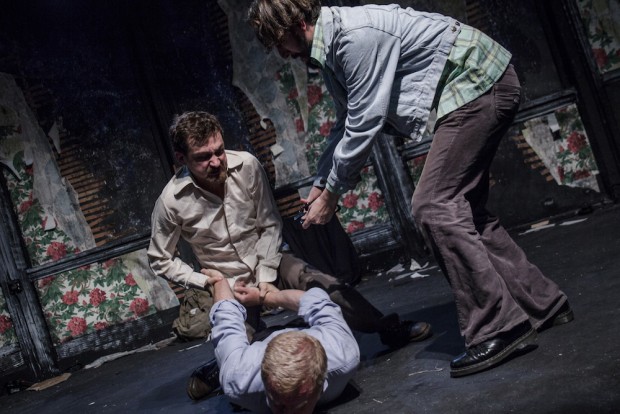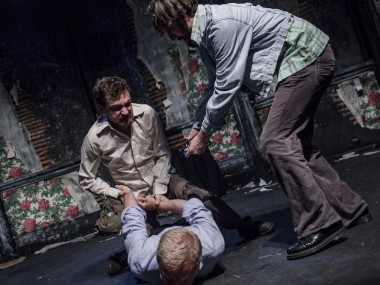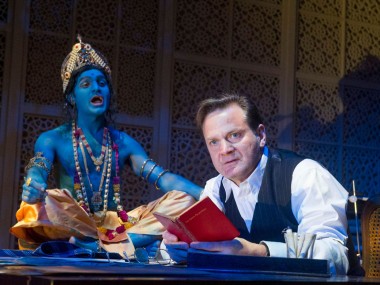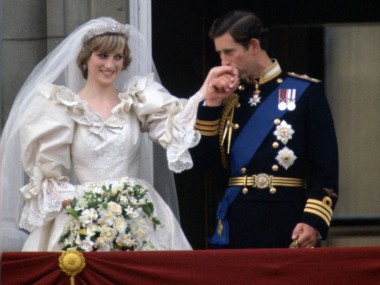Magnificence, Finborough Theatre
Friday 28th October 2016

Before playwright Howard Brenton became the go-to man for history plays, he was a young radical whose main subject was revolution. His 1970s dramas are either excoriating critiques of capitalism or wry accounts of young people trying to change the world. Magnificence, which was first staged by the Royal Court in 1973, is typical in its perceptiveness, satirical edge and contemporary sensibility: at one point in this drama a character tries to fend off the police by quoting from Mao’s Little Red Book! But how does its story about a group of lefty squatters, one of whom turns to terroristic violence, stand the passage of time?
The play opens with a handful of young people — Jed, Will, Cliff, Mary and Veronica — entering a derelict house in order to squat it. They paint revolutionary slogans on the walls and argue among themselves about direct action and class struggle. The provocative stoner Will criticizes Veronica because she is middle class and has a nice, cushy job at the BBC. She lectures the others for being impractical and self-obsessed. The more prosaic, and pregnant, working-class Mary is asked, with the casual sexism typical of the time, to make the tea; meanwhile her lover Jed smoulders with anger. If my memory serves me well, this picture of squatter activists is pretty accurate, if a bit depressing. Oddly enough, the play is not tied to a journalistic account of contemporary politics: it’s the early 1970s, but no one talks about the Tory government of Edward Heath. No one mentions the miners; no one talks about the “unacceptable face of capitalism”.
Although the drama begins in a naturalistic way, Brenton has also written scenes that are more surreal, more dream-like. In one of these, a philosophical policeman and a bailiff called Savage prepare to evict the squatting youngsters and pass the time by discussing Martians, human nature and “Bertrand Russell and the commies”. At one point, Lenin appears on the scene; at another the squatters perform a kind of ballet with tins of food. There are some passages of intense vision. When a middle-aged Tory man, called Alice, visits his older college tutor, called Babs (but also a man), at Cambridge he discovers that his former teacher is on the verge of death. In a moment that seems uncannily to anticipate the Thatcher revolution, the older one-nation Tory calls his younger successor an “English fascist”.
But although Brenton’s play is uneven and uncertain in tone, there a sharp strain of satire and social criticism running through the story, including speeches about addiction and incarceration, idealism and activism, getting high and getting even. Magnificence ends up with Jed, made more militant by a spell in prison, confronting Alice, by now an ex-Cabinet minister, with a home-made explosive device and imagining the rich and powerful as “magnificently ablaze for the delight and encouragement of all your enemies”. Jed’s idea is to “disrupt the spectacle” through violence. In a rather perfunctory epilogue, this act of terror is described as “the waste of your anger”. Yes, that sounds pretty timely still.
The current revival, the first for more than 40 years, is directed by Josh Roche and designed by Phil Lindley in a co-production for Fat Git. Although it captures some of Brenton’s visionary moments well, it is a bit messy and hesitant, as if the task of reconciling the playwright’s switches of tone is just too, too much. Still, Will Bliss (Will) and Joel Gilman (Jed) make a convincing journey from noisy radicalism to exhausted idealism, ending up in a dangerous stand-off in an “English garden”. Eva-Jane Willis (middle-class Veronica) and Daisy Hughes (working-class Mary) give good accounts of the female experience of the early 1970s, while Hayward B Morse and Tim Faulkner are perfectly entertaining as the satirised high Tories. So while this revival proves that Magnificence is worth looking at, it fails to be either compelling or particularly coherent.
© Aleks Sierz




